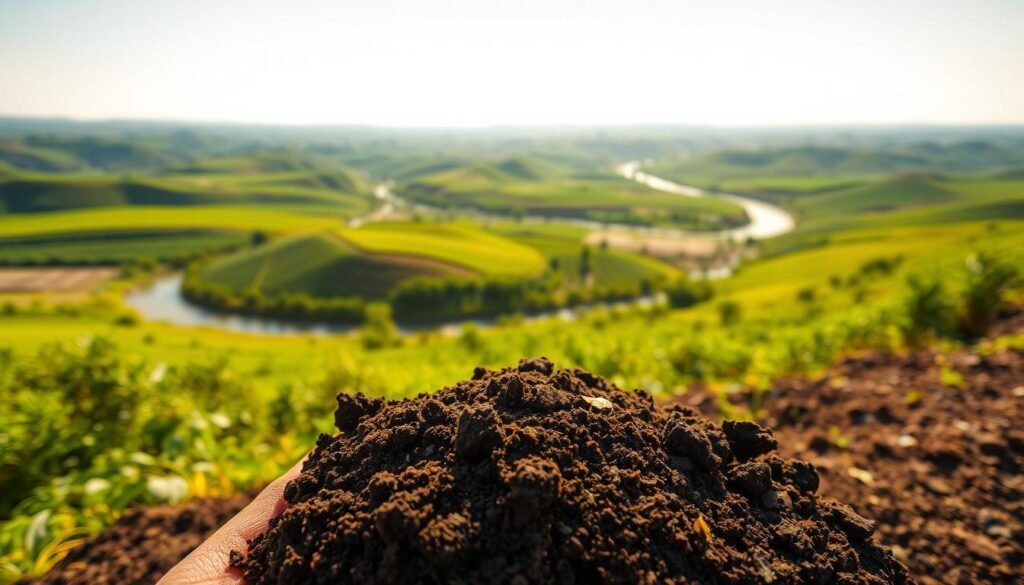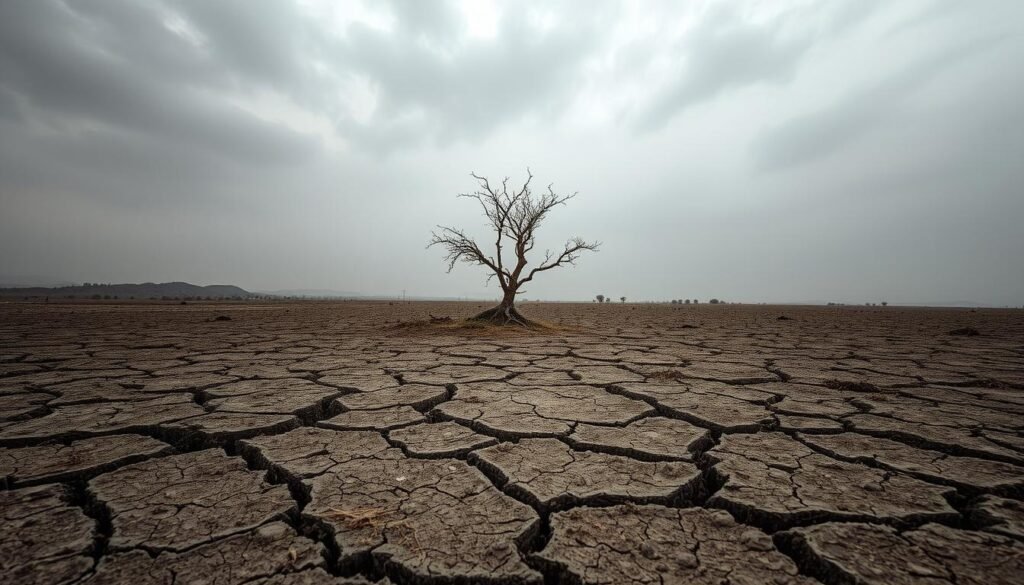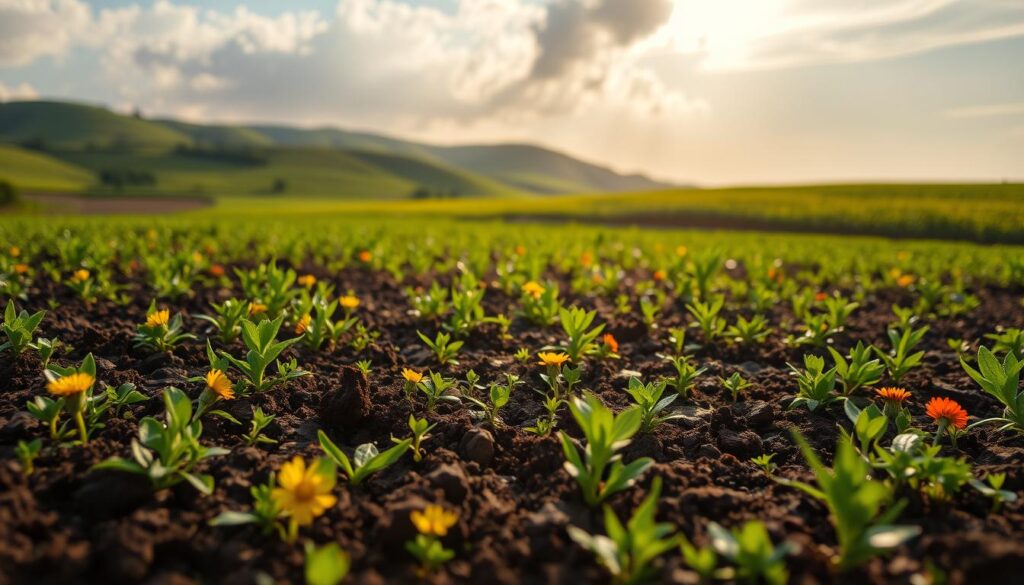Pakistan’s farms are very important for its economy. Many people work in these farms. But, a big problem is that almost 40% of Pakistan’s soil is not healthy.
Healthy soil is key for good land, animals, and food. In Pakistan, soil gets damaged because of too much farming, not changing crops, and bad water use.
Key Takeaways
- Soil degradation affects nearly 40% of Pakistan’s land.
- Agricultural productivity is closely linked to soil health.
- Intensive farming practices contribute to soil degradation.
- Soil health is vital for environmental sustainability and food security.
- Improving soil quality can enhance agricultural productivity in Pakistan.
The Current State of Soil Health in Pakistan
Checking how good Pakistan’s soil health is is key for good farming policies. The country’s farms rely a lot on the soil’s quality. But, the soil faces many problems. Knowing the soil’s health is important for farming that lasts and for food.
Overview of Pakistan’s Agricultural Landscape
Pakistan’s farms are different, from Punjab’s water-rich plains to Balochistan’s dry lands. The soil’s health affects how much food Pakistan can grow. The rich Indus basin is great for farming, but other places struggle with soil problems.
- Agriculture is a big part of Pakistan’s economy.
- Most people make a living from farming.
- Different farming ways are used in each province.
Key Soil Health Indicators and Their Status
Soil health signs like organic matter, nutrients, and salt levels are important. In Pakistan, these signs change a lot by area. For example, salt is a big problem in watered areas, and erosion is a worry in hills.
- Soil organic matter is often low.
- Lack of nutrients, like nitrogen and phosphorus, is common.
- Salinity and waterlogging are big issues in watered areas.
Geographical Distribution of Soil Quality
Soil quality in Pakistan varies by area. Punjab and Sindh have better soil, while Balochistan and parts of Khyber Pakhtunkhwa face more challenges. Knowing these differences helps with better soil care
Read more in this video https://www.youtube.com/watch?v=xqXz1WUKBvQ
Condition and Effects of Soil Health in Pakistan
Pakistan’s soil health varies a lot from place to place. Each area faces its own set of challenges and chances. These differences come from things like weather, land shape, and how people use the land.
Regional Variations in Soil Quality
Soil quality changes a lot in Pakistan. The country’s fields and mountains face different soil health problems.
Punjab and Sindh Agricultural Plains
The Punjab and Sindh plains are very fertile. They have lots of water for farming. But, farming too much water can cause problems like waterlogging and salt in the soil.
- Too much water helps crops grow but can also cause waterlogging.
- Too much salt in the soil makes it less fertile and lowers farm output.
Balochistan and KPK Highlands
The highlands of Balochistan and KPK are tough to farm. Their soil is not as good. Rain and cutting down trees make soil erosion worse.
- Soil erosion gets worse because of rain and trees being cut down.
- It’s hard to protect the soil because of the land’s shape.

Historical Trends in Soil Health
Soil health in Pakistan has been getting worse over time. This is because of bad farming and not enough soil protection. Long-term data shows soil quality getting worse.
- Soil getting worse has been a big problem for a long time.
- Not knowing enough and bad policies have made it worse.
Economic and Social Impacts of Soil Conditions
Poor soil health has big effects on the economy and society. It makes farming less productive. This hurts farmers’ money and food for everyone, causing bigger problems.
- Less crops mean less money for farmers.
- Less food means less food for people, hurting everyone’s health.
Major Soil Types in Pakistan
Knowing the main soil types in Pakistan is key for good farming and keeping the land healthy. Pakistan’s varied landscapes and weather have created many soil types. Each has its own special traits and problems.
Arid and Semi-Arid Soils
Arid and semi-arid soils are common in dry places like Thar and Cholistan deserts. These soils have little organic matter, high pH, and few nutrients.
“Soil health is critical to agricultural productivity and food security,”
Many farmers agree. It’s important to manage these soils well for farming to last in these areas.
Irrigated Plains Soils
The Indus River basin’s plains have very fertile soils. These areas grow many crops like wheat, rice, and cotton. But, too much water can cause problems like waterlogging and salinization, harming the soil.
Mountain and Highland Soils
Mountain and highland soils are in Pakistan’s north, like the Himalayas and Karakoram. These soils are thin, easily eroded, and not great for farming. The tough weather and steep slopes make it hard to farm here. We need to protect these soils and keep the environment healthy.
Factors Affecting Soil Health in Pakistan
Soil health is very important in Pakistan. Climate change, industrialization, and farming practices all play big roles. Good soil health helps farms grow food and keeps the environment healthy.
Climate Change and Weather Patterns
Climate change is changing the weather in Pakistan. This leads to more extreme weather. It makes soil erode more, changes how much water it holds, and messes with how nutrients move.
Soil’s organic matter can also get worse because of warmer temperatures and different rain patterns.

Agricultural Practices and Their Impact
Farming practices greatly affect soil health in Pakistan. The country often uses intensive farming and grows the same crops over and over. This makes the soil worse.
Intensive Farming and Monoculture
Intensive farming uses up soil nutrients and lowers biodiversity. Growing just one crop on land makes it even harder for the soil to get better.
Irrigation Methods and Water Management
Irrigation is key for farming in Pakistan. But, bad irrigation can cause water to build up and make the soil salty. It’s important to manage water well to avoid this.
Industrialization and Urbanization Effects
Industrial growth and cities expanding also harm soil health. More cities and factories mean more pollution. This pollution can make the soil less fertile and unhealthy.
Deforestation and Land Use Changes
Clearing forests for farms or cities hurts soil health too. Trees help keep the soil in place and full of life. Without them, the soil erodes and loses its nutrients.
It’s key to tackle these issues to keep soil healthy in Pakistan. By understanding and fixing these problems, we can make farming better and protect our soil.
Soil Degradation Challenges
Soil degradation in Pakistan is a big problem. It affects different areas in different ways. Soil degradation makes the soil less good for growing things.
FAO says we must fix soil degradation. This is key for farming that lasts and keeps the environment healthy.
Soil Erosion in Different Regions
Soil erosion is a big problem in Pakistan’s hills and mountains. Heavy rain and bad land use make it worse. Experts say it’s like a silent disaster that harms our soil.
Salinization and Waterlogging Issues
In Pakistan’s irrigated plains, salinization and waterlogging are big problems. They happen because of bad irrigation and poor drainage. This makes the soil less fertile and hurts crop yields.
Chemical Contamination and Pollution
Too much fertilizer and pesticide use is another big problem. It harms the soil and pollutes water. This is bad for people and animals.
Nutrient Depletion and Organic Matter Loss
Nutrient loss and organic matter loss are big issues. They come from farming too hard without adding back nutrients. This makes it hard for plants to grow well.
Soil Health Assessment Techniques
Understanding soil health is important in Pakistan. We use different ways to check soil health. This includes looking at the physical, chemical, and biological parts of the soil.
Traditional Soil Testing Methods in Pakistan
In Pakistan, we used to test soil by taking samples. Then, we would send them to labs to check for nutrients and pH levels. But, these methods are not perfect because they are expensive, slow, and not always right.
Modern Soil Analysis Technologies
New technologies like remote sensing and GIS mapping help us better understand soil. They let us check big areas and give us detailed info about the soil.
Soil Health Monitoring Programs and Initiatives
Pakistan has started programs to help soil health. These programs include regular soil tests, teaching farmers, and using the best practices.
Challenges in Soil Quality Assessment
Even with new tech, we still face problems. These include not having access to the latest tools, not enough trained people, and poor infrastructure. We need to solve these issues to keep soil healthy.
Impact of Soil Health on Agricultural Productivity
Soil health is very important for farming. It affects how well crops grow and how much food we have. Healthy soil helps farms stay sustainable.
Crop Yield and Quality Correlations
Good soil is key for growing lots of healthy crops. It has the right nutrients and microbes for plants to thrive. Studies show that better soil can make crops 20% more.
Crops from healthy soil taste better and are more nutritious. For example, they have more vitamins and minerals. This is because of the soil’s organic matter.
Livestock Production and Soil Health
Soil health also matters for animals. Pastures with good soil and plants keep animals healthy. This means they need less food and are happier.
Food Security Implications
Soil health is vital for feeding everyone. With more people coming, we need healthy soil to grow food. It helps with climate change, keeps water clean, and supports animals and plants.
Economic Consequences for Farmers and Communities
Poor soil can hurt farmers’ money. It means less food and lower prices. But, taking care of soil can make farms more profitable and stable.
| Soil Health Indicator | Impact on Agricultural Productivity | Economic Benefit |
|---|---|---|
| Soil Organic Matter | Increased crop yields and improved soil structure | Improved farm profitability |
| Soil Nutrient Balance | Better crop quality and reduced fertilizer costs | Reduced input costs for farmers |
| Soil Microbial Activity | Improved soil fertility and structure | Increased crop yields and quality |
Sustainable Soil Management Practices
Good soil management makes soil healthier and farms more productive in Pakistan. Farmers and leaders can help make farming better for the future.
Conservation Agriculture Techniques
Conservation agriculture is about not disturbing the soil too much. It keeps the soil covered and changes what crops are grown. This reduces erosion, makes soil better, and helps more plants grow.
Minimum Tillage and Residue Management
Minimum tillage keeps the soil intact, which is good for its health. Leaving crop leftovers on the field helps keep the soil moist and safe.
Crop Rotation and Diversification
Changing what crops are grown helps the soil and makes more food. It stops diseases and makes the soil richer.
Organic Farming and Soil Health Improvement
Organic farming uses natural stuff like compost to make soil better. It helps the soil hold water and makes farms stronger.
Water Management for Soil Conservation
Managing water well is key to keeping the soil safe. Using rainwater, smart irrigation, and saving water helps prevent erosion and keeps the soil moist.
Government Initiatives and Policies
The government helps by supporting sustainable farming. They want farmers to use better methods and keep the soil healthy.
National Soil Conservation Programs
National programs give farmers tools and advice for better farming. They focus on stopping erosion, checking soil health, and using conservation methods.
Provincial Soil Management Strategies
Each province has its own plan for soil care. They work with local people and farmers to make plans that work.
Conclusion
Soil health is very important for Pakistan’s farms and the environment. The country’s soil faces many problems like erosion and nutrient loss.
To fix these issues, we need to use green farming methods. These include conservation agriculture and organic farming. They help the soil stay healthy, grow more food, and protect the environment.
The government and others must work together. They need to make policies that help farming be green and soil stay healthy. This will make sure Pakistan has enough food and deals with climate change better.
In short, Pakistan’s soil health is a big problem that needs quick action. By focusing on green farming and soil care, Pakistan can keep its soil safe. This will help the country’s farms stay strong for the future.
you can also read more article https://agriculture111.com/?p=867
